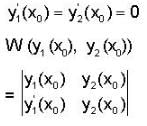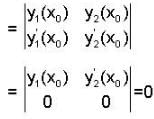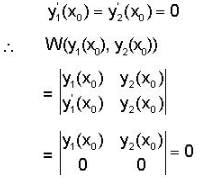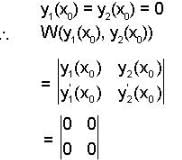Mathematics Exam > Mathematics Questions > let y1(x) and y2(x) form a fundamental Set of...
Start Learning for Free
let y1(x) and y2(x) form a fundamental Set of Solutions (i.e. linearly independent solutions) to the differential equation.

where p (x) abd q (x) are continuous in [ a, b] and X0 is a point in ( a , b ) . Then

where p (x) abd q (x) are continuous in [ a, b] and X0 is a point in ( a , b ) . Then
- a)Both y1(x) and y2(x) can not have a local maximum at X0.
- b)Both y1 (x) and y2(x) can not have a local maximum at Xq.
- c)y1(x) can not have a local maximum at x0 and y2(x) cannot have local minimum at X0 simultaneously.
- d)Both y1(x) and y2(x) cannot Vanish at X0 simultaneously.
Correct answer is option 'A,B,C,D'. Can you explain this answer?
| FREE This question is part of | Download PDF Attempt this Test |
Verified Answer
let y1(x) and y2(x) form a fundamental Set of Solutions (i.e. linearly...
Given that y1(x) and y2(x) forms a fundamental set of solutions to the differential equation

where p(x) and q(x) are continuous in [ a, t ] and X0 ∈ (a, b).

∴


Hence, y1(x) and y2(x) are linearly dependent but y1(x) and y2(x) are form fundamental set of solutions of Eq. (i).
Which is a contradiction . Hence, both y1(x) and y2(x) cannot have local maxima at xo ∈ (a,b).
Hence, option (A) is correct.
(B) Let both y1(x) and y2(x) have local minima at x0∈ (a,b).


Hence, again y1(x) and y2(x) are linearly dependent but y1(x) and y2(x) are form fundamental set of solution of Eq. (i), which is a contradiction . Hence, both y1(x) and y2(x) cannot have local minima at x0∈ (a,b).
Hence, option (B) is correct.
(C) Let y1(x) have a local maximum at x0 and y2(x) have local minima at X0 simultaneously.
Then,

Hence, again y1(x) and y2(x) are linearly dependent but y1(x) and y2(x) are form fundamental set of solution of Eq. (i), which is a contradiction. Hence, y1(x) can not have local maximum at X0∈ (a, b) and y2(x) cannot have local minimum at X0∈ (a, b).
Hence, option (C) is correct.
(d) Let both y1(x) and y2(x) vanishes at x0 simultaneously.
Then,

Hence, again y1(x) and y2(x) are linearly dependent, but y1(x) and y2(x) are form the fundamental set of solution of Eq. (i), which is a contradiction.
Hence, option (D) is correct

where p(x) and q(x) are continuous in [ a, t ] and X0 ∈ (a, b).

∴


Hence, y1(x) and y2(x) are linearly dependent but y1(x) and y2(x) are form fundamental set of solutions of Eq. (i).
Which is a contradiction . Hence, both y1(x) and y2(x) cannot have local maxima at xo ∈ (a,b).
Hence, option (A) is correct.
(B) Let both y1(x) and y2(x) have local minima at x0∈ (a,b).


Hence, again y1(x) and y2(x) are linearly dependent but y1(x) and y2(x) are form fundamental set of solution of Eq. (i), which is a contradiction . Hence, both y1(x) and y2(x) cannot have local minima at x0∈ (a,b).
Hence, option (B) is correct.
(C) Let y1(x) have a local maximum at x0 and y2(x) have local minima at X0 simultaneously.
Then,

Hence, again y1(x) and y2(x) are linearly dependent but y1(x) and y2(x) are form fundamental set of solution of Eq. (i), which is a contradiction. Hence, y1(x) can not have local maximum at X0∈ (a, b) and y2(x) cannot have local minimum at X0∈ (a, b).
Hence, option (C) is correct.
(d) Let both y1(x) and y2(x) vanishes at x0 simultaneously.
Then,

Hence, again y1(x) and y2(x) are linearly dependent, but y1(x) and y2(x) are form the fundamental set of solution of Eq. (i), which is a contradiction.
Hence, option (D) is correct
Most Upvoted Answer
let y1(x) and y2(x) form a fundamental Set of Solutions (i.e. linearly...
Given that y1(x) and y2(x) forms a fundamental set of solutions to the differential equation

where p(x) and q(x) are continuous in [ a, t ] and X0 ∈ (a, b).

∴


Hence, y1(x) and y2(x) are linearly dependent but y1(x) and y2(x) are form fundamental set of solutions of Eq. (i).
Which is a contradiction . Hence, both y1(x) and y2(x) cannot have local maxima at xo ∈ (a,b).
Hence, option (A) is correct.
(B) Let both y1(x) and y2(x) have local minima at x0∈ (a,b).


Hence, again y1(x) and y2(x) are linearly dependent but y1(x) and y2(x) are form fundamental set of solution of Eq. (i), which is a contradiction . Hence, both y1(x) and y2(x) cannot have local minima at x0∈ (a,b).
Hence, option (B) is correct.
(C) Let y1(x) have a local maximum at x0 and y2(x) have local minima at X0 simultaneously.
Then,

Hence, again y1(x) and y2(x) are linearly dependent but y1(x) and y2(x) are form fundamental set of solution of Eq. (i), which is a contradiction. Hence, y1(x) can not have local maximum at X0∈ (a, b) and y2(x) cannot have local minimum at X0∈ (a, b).
Hence, option (C) is correct.
(d) Let both y1(x) and y2(x) vanishes at x0 simultaneously.
Then,

Hence, again y1(x) and y2(x) are linearly dependent, but y1(x) and y2(x) are form the fundamental set of solution of Eq. (i), which is a contradiction.
Hence, option (D) is correct

where p(x) and q(x) are continuous in [ a, t ] and X0 ∈ (a, b).

∴


Hence, y1(x) and y2(x) are linearly dependent but y1(x) and y2(x) are form fundamental set of solutions of Eq. (i).
Which is a contradiction . Hence, both y1(x) and y2(x) cannot have local maxima at xo ∈ (a,b).
Hence, option (A) is correct.
(B) Let both y1(x) and y2(x) have local minima at x0∈ (a,b).


Hence, again y1(x) and y2(x) are linearly dependent but y1(x) and y2(x) are form fundamental set of solution of Eq. (i), which is a contradiction . Hence, both y1(x) and y2(x) cannot have local minima at x0∈ (a,b).
Hence, option (B) is correct.
(C) Let y1(x) have a local maximum at x0 and y2(x) have local minima at X0 simultaneously.
Then,

Hence, again y1(x) and y2(x) are linearly dependent but y1(x) and y2(x) are form fundamental set of solution of Eq. (i), which is a contradiction. Hence, y1(x) can not have local maximum at X0∈ (a, b) and y2(x) cannot have local minimum at X0∈ (a, b).
Hence, option (C) is correct.
(d) Let both y1(x) and y2(x) vanishes at x0 simultaneously.
Then,

Hence, again y1(x) and y2(x) are linearly dependent, but y1(x) and y2(x) are form the fundamental set of solution of Eq. (i), which is a contradiction.
Hence, option (D) is correct

|
Explore Courses for Mathematics exam
|

|
Similar Mathematics Doubts
let y1(x) and y2(x) form a fundamental Set of Solutions (i.e. linearly independent solutions) to the differential equation.where p (x) abd q (x) are continuous in [ a, b] and X0 is a point in ( a , b ) . Thena)Both y1(x) and y2(x) can not have a local maximum at X0.b)Both y1 (x) and y2(x) can not have a local maximum at Xq.c)y1(x) can not have a local maximum at x0 and y2(x) cannot have local minimum at X0simultaneously.d)Both y1(x) and y2(x) cannot Vanish at X0simultaneously.Correct answer is option 'A,B,C,D'. Can you explain this answer?
Question Description
let y1(x) and y2(x) form a fundamental Set of Solutions (i.e. linearly independent solutions) to the differential equation.where p (x) abd q (x) are continuous in [ a, b] and X0 is a point in ( a , b ) . Thena)Both y1(x) and y2(x) can not have a local maximum at X0.b)Both y1 (x) and y2(x) can not have a local maximum at Xq.c)y1(x) can not have a local maximum at x0 and y2(x) cannot have local minimum at X0simultaneously.d)Both y1(x) and y2(x) cannot Vanish at X0simultaneously.Correct answer is option 'A,B,C,D'. Can you explain this answer? for Mathematics 2024 is part of Mathematics preparation. The Question and answers have been prepared according to the Mathematics exam syllabus. Information about let y1(x) and y2(x) form a fundamental Set of Solutions (i.e. linearly independent solutions) to the differential equation.where p (x) abd q (x) are continuous in [ a, b] and X0 is a point in ( a , b ) . Thena)Both y1(x) and y2(x) can not have a local maximum at X0.b)Both y1 (x) and y2(x) can not have a local maximum at Xq.c)y1(x) can not have a local maximum at x0 and y2(x) cannot have local minimum at X0simultaneously.d)Both y1(x) and y2(x) cannot Vanish at X0simultaneously.Correct answer is option 'A,B,C,D'. Can you explain this answer? covers all topics & solutions for Mathematics 2024 Exam. Find important definitions, questions, meanings, examples, exercises and tests below for let y1(x) and y2(x) form a fundamental Set of Solutions (i.e. linearly independent solutions) to the differential equation.where p (x) abd q (x) are continuous in [ a, b] and X0 is a point in ( a , b ) . Thena)Both y1(x) and y2(x) can not have a local maximum at X0.b)Both y1 (x) and y2(x) can not have a local maximum at Xq.c)y1(x) can not have a local maximum at x0 and y2(x) cannot have local minimum at X0simultaneously.d)Both y1(x) and y2(x) cannot Vanish at X0simultaneously.Correct answer is option 'A,B,C,D'. Can you explain this answer?.
let y1(x) and y2(x) form a fundamental Set of Solutions (i.e. linearly independent solutions) to the differential equation.where p (x) abd q (x) are continuous in [ a, b] and X0 is a point in ( a , b ) . Thena)Both y1(x) and y2(x) can not have a local maximum at X0.b)Both y1 (x) and y2(x) can not have a local maximum at Xq.c)y1(x) can not have a local maximum at x0 and y2(x) cannot have local minimum at X0simultaneously.d)Both y1(x) and y2(x) cannot Vanish at X0simultaneously.Correct answer is option 'A,B,C,D'. Can you explain this answer? for Mathematics 2024 is part of Mathematics preparation. The Question and answers have been prepared according to the Mathematics exam syllabus. Information about let y1(x) and y2(x) form a fundamental Set of Solutions (i.e. linearly independent solutions) to the differential equation.where p (x) abd q (x) are continuous in [ a, b] and X0 is a point in ( a , b ) . Thena)Both y1(x) and y2(x) can not have a local maximum at X0.b)Both y1 (x) and y2(x) can not have a local maximum at Xq.c)y1(x) can not have a local maximum at x0 and y2(x) cannot have local minimum at X0simultaneously.d)Both y1(x) and y2(x) cannot Vanish at X0simultaneously.Correct answer is option 'A,B,C,D'. Can you explain this answer? covers all topics & solutions for Mathematics 2024 Exam. Find important definitions, questions, meanings, examples, exercises and tests below for let y1(x) and y2(x) form a fundamental Set of Solutions (i.e. linearly independent solutions) to the differential equation.where p (x) abd q (x) are continuous in [ a, b] and X0 is a point in ( a , b ) . Thena)Both y1(x) and y2(x) can not have a local maximum at X0.b)Both y1 (x) and y2(x) can not have a local maximum at Xq.c)y1(x) can not have a local maximum at x0 and y2(x) cannot have local minimum at X0simultaneously.d)Both y1(x) and y2(x) cannot Vanish at X0simultaneously.Correct answer is option 'A,B,C,D'. Can you explain this answer?.
Solutions for let y1(x) and y2(x) form a fundamental Set of Solutions (i.e. linearly independent solutions) to the differential equation.where p (x) abd q (x) are continuous in [ a, b] and X0 is a point in ( a , b ) . Thena)Both y1(x) and y2(x) can not have a local maximum at X0.b)Both y1 (x) and y2(x) can not have a local maximum at Xq.c)y1(x) can not have a local maximum at x0 and y2(x) cannot have local minimum at X0simultaneously.d)Both y1(x) and y2(x) cannot Vanish at X0simultaneously.Correct answer is option 'A,B,C,D'. Can you explain this answer? in English & in Hindi are available as part of our courses for Mathematics.
Download more important topics, notes, lectures and mock test series for Mathematics Exam by signing up for free.
Here you can find the meaning of let y1(x) and y2(x) form a fundamental Set of Solutions (i.e. linearly independent solutions) to the differential equation.where p (x) abd q (x) are continuous in [ a, b] and X0 is a point in ( a , b ) . Thena)Both y1(x) and y2(x) can not have a local maximum at X0.b)Both y1 (x) and y2(x) can not have a local maximum at Xq.c)y1(x) can not have a local maximum at x0 and y2(x) cannot have local minimum at X0simultaneously.d)Both y1(x) and y2(x) cannot Vanish at X0simultaneously.Correct answer is option 'A,B,C,D'. Can you explain this answer? defined & explained in the simplest way possible. Besides giving the explanation of
let y1(x) and y2(x) form a fundamental Set of Solutions (i.e. linearly independent solutions) to the differential equation.where p (x) abd q (x) are continuous in [ a, b] and X0 is a point in ( a , b ) . Thena)Both y1(x) and y2(x) can not have a local maximum at X0.b)Both y1 (x) and y2(x) can not have a local maximum at Xq.c)y1(x) can not have a local maximum at x0 and y2(x) cannot have local minimum at X0simultaneously.d)Both y1(x) and y2(x) cannot Vanish at X0simultaneously.Correct answer is option 'A,B,C,D'. Can you explain this answer?, a detailed solution for let y1(x) and y2(x) form a fundamental Set of Solutions (i.e. linearly independent solutions) to the differential equation.where p (x) abd q (x) are continuous in [ a, b] and X0 is a point in ( a , b ) . Thena)Both y1(x) and y2(x) can not have a local maximum at X0.b)Both y1 (x) and y2(x) can not have a local maximum at Xq.c)y1(x) can not have a local maximum at x0 and y2(x) cannot have local minimum at X0simultaneously.d)Both y1(x) and y2(x) cannot Vanish at X0simultaneously.Correct answer is option 'A,B,C,D'. Can you explain this answer? has been provided alongside types of let y1(x) and y2(x) form a fundamental Set of Solutions (i.e. linearly independent solutions) to the differential equation.where p (x) abd q (x) are continuous in [ a, b] and X0 is a point in ( a , b ) . Thena)Both y1(x) and y2(x) can not have a local maximum at X0.b)Both y1 (x) and y2(x) can not have a local maximum at Xq.c)y1(x) can not have a local maximum at x0 and y2(x) cannot have local minimum at X0simultaneously.d)Both y1(x) and y2(x) cannot Vanish at X0simultaneously.Correct answer is option 'A,B,C,D'. Can you explain this answer? theory, EduRev gives you an
ample number of questions to practice let y1(x) and y2(x) form a fundamental Set of Solutions (i.e. linearly independent solutions) to the differential equation.where p (x) abd q (x) are continuous in [ a, b] and X0 is a point in ( a , b ) . Thena)Both y1(x) and y2(x) can not have a local maximum at X0.b)Both y1 (x) and y2(x) can not have a local maximum at Xq.c)y1(x) can not have a local maximum at x0 and y2(x) cannot have local minimum at X0simultaneously.d)Both y1(x) and y2(x) cannot Vanish at X0simultaneously.Correct answer is option 'A,B,C,D'. Can you explain this answer? tests, examples and also practice Mathematics tests.

|
Explore Courses for Mathematics exam
|

|
Suggested Free Tests
Signup for Free!
Signup to see your scores go up within 7 days! Learn & Practice with 1000+ FREE Notes, Videos & Tests.


















